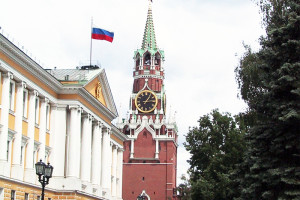‘Propaganda Bullhorn’ Or ‘Alternative Perspective’? U.S. Students Put Kremlin-Funded RT Under Microscope

(RFE/RL – rferl.org – Carl Schreck – February 25, 2015)
Few global media outlets elicit such polarized opinions of its coverage as Russia’s state-funded television network RT, which the United States’ top diplomat has called a “propaganda bullhorn” for the Kremlin during the Ukraine crisis.
Now, a group of graduate students at a leading U.S. journalism school are in the midst of tracking the network’s broadcasts and online output for a project examining in part whether criticism of RT as a fountain of Kremlin disinformation is justified.
“Even if Western academics or people in the foreign policy-D.C. circles chalk the channel off, RT clearly has a significant audience. And so we felt like, ‘Well, nobody’s actually taking a yardstick and measuring what they’re doing. And somebody should be,'” said Pola Lem, a student at the Columbia University Graduate School of Journalism in New York City.
Lem and more than a dozen of her fellow students this month launched a blog called RT Watch [http://rtwatchcuj.tumblr.com/] as part of the project for a class titled Audience And Engagement co-taught by Ann Cooper, the first Moscow bureau chief for National Public Radio (NPR), and Linette Lopez, the senior finance editor for Business Insider.
The students have dissected RT’s coverage of a range of stories, from send-ups of U.S. Vice President Joe Biden (Finally, Something RT And U.S. Media Can Agree On, the RT Watch headline reads) to dispatches from RT war correspondents on the ground in eastern Ukraine.
Other recent RT Watch posts address the network’s rosy spin on the Russian ruble’s travails and Chechen leader Ramzan Kadyrov’s claim that Western nations “spawned” Islamic State militants to “in order to spark hatred of Islam in the hearts of people all over the planet.”
“RT’s article dutifully reported Kadyrov’s theories with no skepticism,” Casey Michel, a contributor to the project, wrote in his February 24 post on the network’s report.
Michel, a graduate student at Columbia’s Harriman Institute for Russian, Eurasian, and East European Studies, told RFE/RL that “there’s generally a knee-jerk reaction” in any discussion about RT.
“And I’ve fallen prey to that as much as anyone in the past, just dismissing it out of hand. And what we’re trying to explore over the next few weeks is whether that is grounded in some kind of reality,” he said.
The initiative is set to run for several more weeks until the end of the current semester and will then be picked up by a new group of students, Cooper told RFE/RL.
‘More Complex Picture’
Launched in 2005 and previously known as Russia Today, RT has served as a high-profile platform for conveying the Russian government’s position. The network says it “provides an alternative perspective on major global events, and acquaints an international audience with the Russian viewpoint.”
RT has come under increasing fire from U.S. and EU officials who accuse it of disseminating distorted coverage of Russia’s annexation of Ukraine’s Crimean Peninsula and the armed conflict between pro-Russian separatists and Kyiv’s forces in eastern Ukraine.
In April, U.S. Secretary of State John Kerry called the network “a propaganda bullhorn” deployed by the Kremlin “to promote [Russian] President [Vladimir] Putin’s fantasy about what is playing out on the ground” in Ukraine.
RT editor in chief Margarita Simonyan responded by expressing “surprise” that “at this difficult and embarrassing time,” Kerry “has nothing else to worry about apart from our television channel.”
Cooper told RFE/RL that most of what people know about RT likely comes from “what they’ve read in mainstream-media articles, where the operative line is ‘Kremlin propaganda arm.'”
“I think the articles go on to make their case for using that phrase. But I think there’s more to this. It’s a more complex picture,” she said.
Article from Radio Free Europe/Radio Liberty c ©2015 RFE/RL, Inc. Article also appeared at rferl.org/content/rt-propaganda-columbia-journalism-students-blog-coverage/26869048.html
